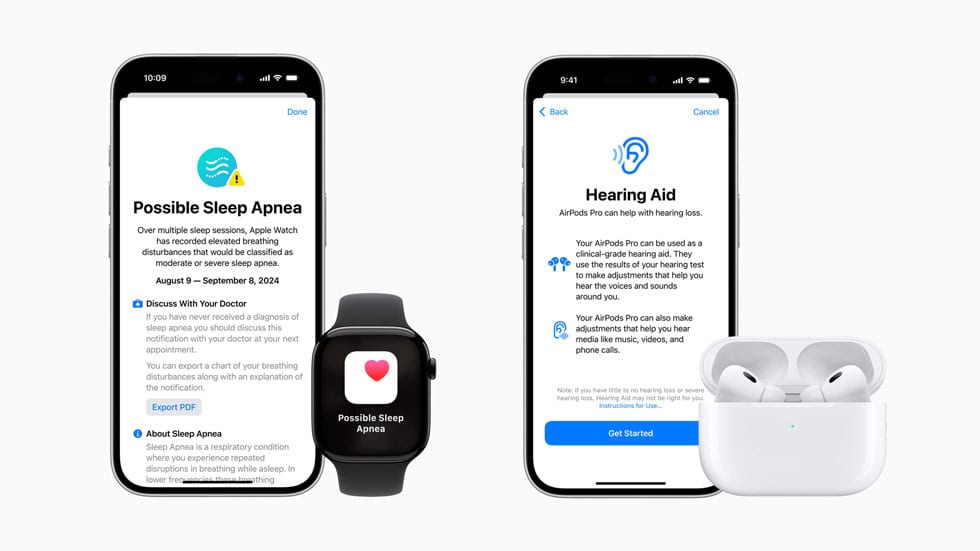In response to escalating global health challenges, Apple has introduced new features within its Health app that specifically target issues such as sleep apnea, mental health, and vision care. By integrating tools for mood tracking and thorough sleep monitoring, these innovations aim to foster a more health-conscious user base. Additionally, the emphasis on data privacy and collaboration with healthcare professionals raises important questions about the efficacy and ethical implications of such technology. As these features unfold, their potential impact on personal and public health remains to be seen.
Addressing Global Health Challenges
Addressing global health challenges is essential in an era where a considerable portion of the population faces various health issues. The prevalence of sleep apnea, affecting over 1 billion individuals globally, often goes undiagnosed, leading to severe health complications such as hypertension and diabetes.
Concurrently, approximately 1.5 billion people experience hearing loss, which is linked to dementia and social isolation. Global health authorities emphasize the importance of addressing these interconnected concerns through innovative health features.
Mental health features have emerged as crucial tools in supporting emotional awareness and resilience, particularly as mental health issues impact over 30% of U.S. adults. These tools aim to enhance users’ understanding of their emotional states and coping mechanisms.
Additionally, the rise of myopia, projected to affect 50% of the global population by 2050, underscores the need for preventive measures and awareness in eye health.
Furthermore, with one in three individuals regularly exposed to harmful noise levels, the integration of hearing health features becomes imperative. By focusing on these areas, health technology can contribute notably to improving overall wellness and addressing global health challenges effectively.
Innovations in Mental Health
Recent innovations in mental health technology are transforming the way individuals engage with their emotional well-being. With over 30% of U.S. adults reporting symptoms of anxiety or depression, the introduction of advanced health applications is essential for promoting emotional awareness and providing accessible mental health assessments.
Some key features of these innovations include:
- Mood Tracking: Users can log momentary emotions and daily moods, identifying feelings on a spectrum from “Very Pleasant” to “Very Unpleasant.”
- Reflection Tools: Research shows that reflecting on mental states can enhance emotional resilience, with over 80% of participants increasing their emotional awareness after using tracking tools.
- Insight Generation: Health applications offer insights into factors affecting mental states, such as sleep and exercise, enabling users to recognize impactful associations in their lives.
- Enhanced Well-being: Studies suggest that logging feelings can lead to reduced negative emotions and improved overall well-being, allowing individuals to take proactive steps in managing their mental health.
These innovations not only facilitate better understanding of one’s mental health but also empower users to cultivate healthier emotional habits.
Enhancements for Vision Care
With the growing prevalence of myopia, which currently affects over 30% of the global population, advancements in vision care technology have become increasingly essential.
As myopia is projected to affect 50% of individuals by 2050, addressing this public health concern is critical. Apple Health has introduced features aimed at enhancing vision health, particularly for children and young adults.
One significant innovation is the Screen Distance feature, which encourages users to maintain a distance of over 12 inches from digital devices. This initiative promotes healthy viewing habits, helping to reduce digital eyestrain, a common issue in our technology-driven lives.
Additionally, Apple Health emphasizes the importance of spending time outdoors, aligning with expert recommendations that suggest children should engage in 80-120 minutes of daylight exposure daily to mitigate myopia risks.
The Importance of Sleep Monitoring
Sleep monitoring plays an essential role in identifying and addressing various sleep disorders, including sleep apnea, which affects over 1 billion people globally. This condition is often underdiagnosed, yet it poses serious health risks such as hypertension, type 2 diabetes, and cardiac issues.
By utilizing advanced sleep monitoring technologies, individuals can gain important insights into their sleep patterns and overall health.
The benefits of sleep monitoring include:
- Identification of Sleep Disorders: Monitoring can reveal interruptions in breathing, indicating potential sleep apnea or other disorders.
- Enhanced Sleep Quality Awareness: Users become more attuned to their sleep quality and duration, leading to better overall health and well-being.
- Timely Healthcare Discussions: Early detection of sleep disturbances allows individuals to engage in meaningful conversations with healthcare providers.
- Empowerment for Healthier Habits: Understanding sleep issues can motivate individuals to adopt healthier sleep practices and pursue appropriate medical interventions.
Incorporating sleep monitoring into personal health management not only improves individual well-being but also addresses a significant global health issue, paving the way for healthier sleep patterns and improved quality of life.
Privacy Measures and Data Security
In today’s digital landscape, safeguarding personal health information has become a paramount concern for users of health technology. Apple has implemented robust privacy measures to guarantee that health data remains secure and accessible only to authorized users. By employing end-to-end encryption and two-factor authentication, Apple effectively protects sensitive information against unauthorized access.
| Privacy Feature | Description | Impact on User Access |
|---|---|---|
| Data Encryption | Health data is encrypted on devices with passcodes, Touch ID, or Face ID. | Protects against unauthorized access. |
| iCloud Backup Encryption | Health data is encrypted during transit and storage on Apple servers. | Guarantees secure backups. |
| End-to-End Encryption | Only users can access their health information. | No third-party access. |
| Granular User Control | Users can manage what data is shared and review permissions. | Enhances data security. |
| Continuous Enhancements | Ongoing updates to privacy measures protect sensitive information. | Strengthens overall security. |
These measures reflect a commitment to data security, enabling users to manage their health information confidently and securely in an increasingly interconnected world.
Collaborating With the Medical Community
The integration of robust privacy measures sets the stage for Apple to engage more effectively with the medical community. This collaboration is essential for addressing pressing global health issues and improving healthcare outcomes.
Apple’s strategic partnerships with health organizations and academic institutions have led to innovative research initiatives that tackle health disparities and promote preventive care.
Key collaborative efforts include:
- Diverse Participant Recruitment: Utilizing the ResearchKit framework, Apple facilitates the inclusion of varied demographics in health studies, enhancing validity, particularly in women’s health and heart disease.
- Comprehensive Health Records: By integrating data from over 800 healthcare institutions, Apple streamlines access to crucial health information, enabling better decision-making for both patients and providers.
- Remote Monitoring Initiatives: Developed in partnership with healthcare professionals, these initiatives aim to enhance patient engagement and improve outcomes for chronic conditions while reducing overall healthcare costs.
- Public Health Collaborations: Focused on leveraging technology and data, these collaborations aim to promote healthier lifestyles and address significant health disparities within communities.
Through these efforts, Apple is demonstrating a commitment to transforming healthcare and contributing to global health solutions.
Future of Apple Health Features
As advancements in health technology continue to evolve, the future of Apple Health features is set to enhance user engagement and streamline health management practices. Apple is poised to introduce innovative health features that address pressing global health issues, such as mental health and chronic condition management. By integrating all-encompassing healthcare solutions and forming partnerships with healthcare providers, Apple Health aims to increase accessibility to effective health management tools.
Future updates will likely focus on enhancing user education to maximize health benefits, especially in preventive care. Additionally, innovative mood tracking and emotional awareness tools can help alleviate anxiety and depression. The platform’s commitment to privacy and data protection will remain paramount, ensuring users’ personal health data is secure while benefiting from advanced monitoring capabilities.
| Feature | Benefit | Focus Area |
|---|---|---|
| Mood Tracking | Supports mental health management | Mental Health |
| Outdoor Activity | Promotes physical wellness | Vision Health |
| All-encompassing Tools | Streamlines health management | Chronic Condition Support |
With these advancements, Apple Health is set to redefine the landscape of health technology.
Final Thoughts
The introduction of new Apple Health features reflects a significant response to pressing global health challenges. Importantly, studies indicate that approximately 1 billion people worldwide suffer from myopia, underscoring the urgency of vision care innovations. Coupled with advancements in mental health support and sleep monitoring, these tools aim to enhance user awareness and promote healthier lifestyles. The commitment to robust privacy measures and collaboration with the medical community further strengthens the efficacy of these health management solutions.






